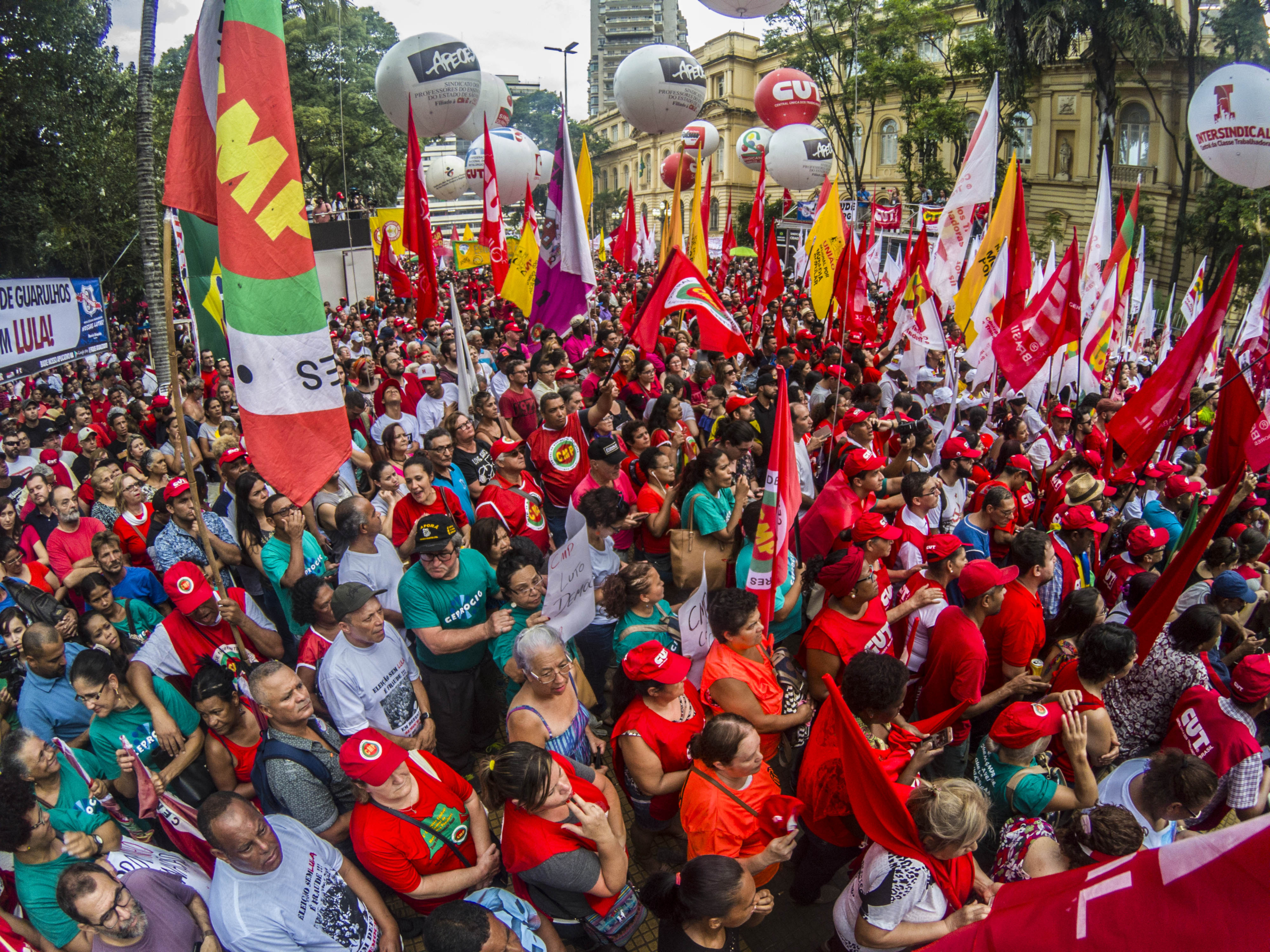The day was just beginning at Largo do Arouche, once a charming square in the center of São Paulo. It was just past 8am on January 10, and a group of protesters was trying to break down the entrance door of the office of the safety guards’ union, infuriated by an audio they heard via social media that was attributed to the union’s president, saying “guards have to be badly paid.”
The result of the protest: six people wounded by the explosion of a homemade bomb. The audio: false.
The incident was really just a test run for the upcoming election season in Brazil, which will be as much about fake news as anything. Since 2002, when Luis Inacio Lula da Silva was elected president, corruption scandals have eroded the reputation of Brazil’s political system. (His successor, Dilma Rousseff, was hit by an impeachment process in 2016.) In the late ‘80s, when the country returned to a democratic system, more than 50 percent of Brazil’s voting population declared they identified with one of the main parties. Today, less than 10 percent still identify that way, according to a survey recently updated by the Center for Public Policy Research at São Paulo State University.
And voters are convinced fake news will invade Brazil’s elections this year. In hopes of counteracting misinformation, newspapers have grown and independent watchdog agencies sprung up. In 2014, the newspaper O Globo created the “Preto no Branco” (Pen on Paper) blog, intended to fact-check information. Its creator, Cristina Tardáguila, left the paper’s newsroom in 2015 to create the Agência Lupa, the first specialized watchdog team to operate in Brazil. Starting with four journalists, today Lupa is comprised of 15 people working for clients such as the newspaper Folha de S.Paulo, the website Metrópoles, Piauí magazine, and the CBN news radio network (where I am director of journalism). “We have expanded the team to deal with this year’s events,” says Tardáguila. She predicts the elections this summer “will be packed with false news and robots trying to control the political narrative,” adding that “this will be the election of memes and misinformation.” (Meantime, O Globo has created its own watchdog team called “É isso mesmo?” (“Is that really it?”)
As in the US, news bots and fake social media profiles proliferate in Brazil. After unions called for a general strike in April 2017, “over 20 percent of the Twitter interactions among users in favor of the strike were provoked by false profiles,” according to a study by the education and research institution Getulio Vargas Foundation, which adds that in 2014, robots managed to generate over 10 percent of the online discussions around the presidential election. Referring to the foundation’s work, Twitter Brasil states that it had no access to the research methodology, but considers that “external partners may face difficulties when making unilateral measurements on the platform.”
The elections this summer “will be packed with false news and robots trying to control the political narrative,” Tardáguila predicts.
Other fact-checking agencies have appeared, such as Truco (named for the shout-out in popular Brazilian card game that translates to “Is it true?”). “This year, we will move from five states to 10, covering regional elections,” says Natalia Viana, who runs Truco. The group has partnerships with Exame (a Brazilian economic and business magazine) and Jovem Pan, a national radio network.
Created in 2015, Aos Fatos started with two individuals and now has a staff of nine professionals. This agency works for news websites and has a partnership with Facebook in Brazil providing cross-checking tips via Messenger. Tai Nalon, co-founder, says they are expanding partnerships, which included in 2016 BuzzFeed Brasil. Among others, they also work with UOL, a national news and internet services portal.
In addition to the press, government agencies also are preparing to scrutinize the summer elections. Elections in Brazil have been 100 percent electronic since 2002, and paper ballots are no longer used. In January, Minister Gilmar Mendes, who at that time presided over the TSE (Tribunal Superior Eleitoral, which is Brazil’s highest electoral court in charge of watching over the elections to prevent fraud) announced the creation of a task force against fake news. The initiative will form an advisory board constituted by the government’s intelligence area, citizen representatives, and even the army.
The first meeting of the TSE with the social media giants happened early in February. At the meeting, Mendes offered assurances that the measures against fake news won’t result in censorship. “But they will protect privacy and honor,” he warned.
Governors and politicians frequently label any information that bothers them as fake news. “This is another risk we will have to face this year,” says Patricia Blanco, president of the Instituto Palavra Aberta, a nongovernmental organization that watches over freedom of expression. “Under the pretext of combating fake news, politicians and candidates may use this as an excuse for censorship, restricting publications or even asking for content to be removed.” Among other causes, the Palavra Aberta has promoted a discussion on the danger of legal provisions—some already underway—that may allow judges to determine the immediate removal of content.
There are currently at least three bills underway at the National Congress proposed by members of the house who say they intend to fight fake news. The texts try to criminalize authors of false information and even establish fines. “Brazilians have a habit of creating opportunistic, last-minute laws that are not always effective. And these may involve other risks against the free circulation of information,” says press lawyer Taís Gasparian.
ICYMI: Facebook pulls back the curtain on what kinds of speech it tolerates
Ricardo Gandour is director of journalism at CBN News Radio Brazilian Network and associate professor of journalism at ESPM School, Sao Paulo, Brazil. Follow him @rgandour.

